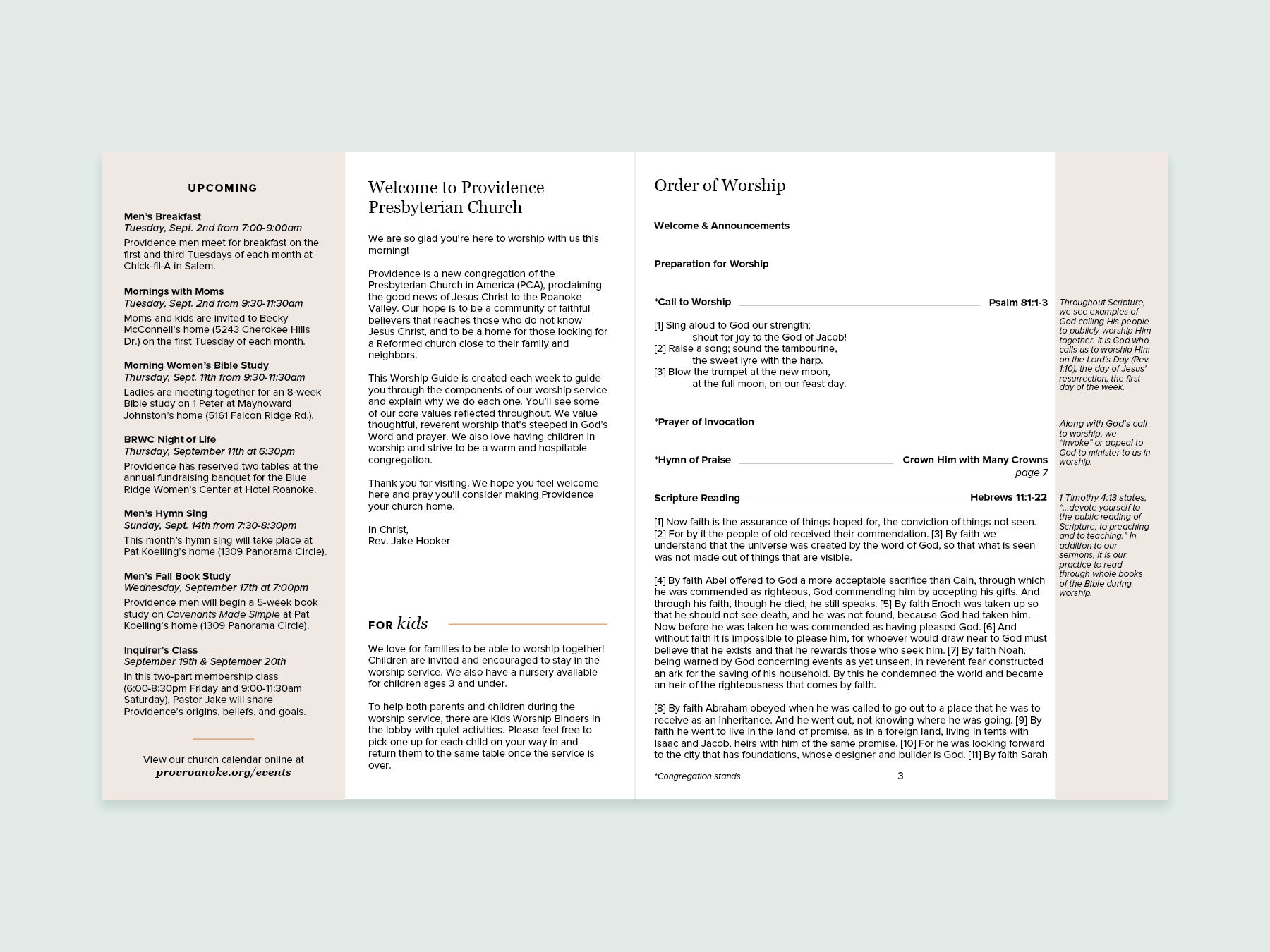The Unchained Gospel - Philippians 1:12-18a
Most of the time, whenever there is a protest that turns into a riot, as soon as people begin to get arrested, the cause doesn’t seem quite as important anymore. It doesn’t really matter the cause for your protest—whether political, social, or cultural—once the handcuffs come out, once jail time is on the table, many people begin to rethink their level of commitment. The fire of the cause cools when faced with the cost of imprisonment.







And usually, that’s where the cause ends. There was a brief moment, where things got out of hand, but people were arrested and then life continued on as normal.
Which is why Paul’s imprisonment is so different. Because once the chains were put on Paul, the gospel of Christ was completely unaffected. In fact, it picked up steam! His arrest actually helped the message! It did not silence the gospel, but rather amplified it. His willingness to suffer for Christ emboldened others to preach the gospel more courageously.
That is the shocking, countercultural reality of the gospel: where the world expects defeat, the gospel often advances in greater power. Where the world sees rivalry as a threat, Paul sees Christ being lifted up. The very circumstances that should have crushed his spirit instead became reasons for his joy, because his ultimate concern was not his reputation, not his comfort, not even his freedom—it was the exaltation of Jesus’ name.
That’s a tough lesson for us today. Can we look past the things we dislike about certain churches, denominations, or ministries and still say with Paul, “Whether in pretense or in truth, Christ is proclaimed, and in that I rejoice”?
This passage gives us three reasons to rejoice: first, the gospel advances even in hardship (vv. 12–13); second, gospel boldness multiplies gospel boldness (v. 14); and third, gospel proclamation is always cause for celebration (vv. 15–18).
Last week, we saw how Paul deeply loved the church in Philippi—and how the Philippians loved him in return. There was a profound mutual affection between them, especially evident when the church sent Epaphroditus to deliver support to Paul and to check on his well-being. It’s clear that the Philippians were genuinely concerned for the Apostle’s well-being, because he was imprisoned!
The gospel advances even in hardship (vv. 12–13)
When you look at the broader circumstances of the book of Philippians, I think we’d all be concerned if a dear brother in the Lord was imprisoned for faithfully preaching the gospel. It’s only by God’s grace that’s really not a significant threat here in the United States, but as I’m sure you’re aware, that sort of thing happens all the time in various parts of the world. People are imprisoned for their faith in Christ all the time.
But imagine with me for just a second that being a Christian was illegal here in the United States and you were caught. If someone, somewhere turned you in for your faith in Christ, how would you react? Would you feel sorry for yourself? Would you question your faith? Are the trials really worth it? Would you deny Christ if it meant you would be released from jail?
Or would you say, “that what has happened to [you] has really served to advance the gospel…”? Because that’s exactly what the Apostle Paul said about his imprisonment in verse 12. Paul makes it abundantly clear that his imprisonment was not a hindrance to the gospel. In fact, God was using it to advance the gospel.
Paul said, “[the gospel] has become known throughout the whole imperial guard and to all the rest that my imprisonment is for Christ.”
If the gospel was going forth in power, how could he possibly sit around feeling sorry for himself all day! Word has spread far and wide that Paul was imprisoned for Christ, which meant people are hearing the good news of Jesus Christ!
We’re so easily tempted to believe that pain, hardship, and trials are always bad. And granted, no one ever wants to go through pain, hardship, or a trial — no one ever wants to suffer. But the reality is, God is more than capable of working in and through your suffering for his own glory. And so the challenge for all of us is that from time to time we may have to look beyond our immediate circumstances and try to see where God is at work!
While imprisoned, Paul did not see his chains as a burden but a platform for the gospel. And the same is true for us today: our workplace struggles, family challenges, or even sickness can be a place where the gospel of Christ can be proclaimed in a real and powerful way. When a co-worker sees your patience under pressure, your honesty when no one is watching, or your grace in conflict, they are seeing the gospel in action. When a family member observes your humility, your forgiveness, or your steadfast trust in God despite hardship, the story of Christ is being told without a single word. Even in sickness, when we demonstrate faith, courage, and hope – we’re pointing others to Christ’s sustaining power.
Many of you watched this first hand in your friend, Brian Zimmerman, who saw his cancer diagnosis not as an opportunity to wallow in self-pity, but as an opportunity to proclaim the hope that he had in Christ. Before he passed away his thoughts on death and his hope in Christ were compiled into a book called “The Dying Man Lives: Biblical Hope for Confronting Cancer and the End of Life.”
The gospel of Christ shines the brightest where pain, suffering, and hardship seem overwhelming.
Gospel boldness multiplies gospel boldness (v. 14)
I’ve been reading a lot of Civil War history recently, and I just finished a biography on Stonewall Jackson. One of the most striking things about him was his powerful, calm presence on the battlefield—which earned him the famous nickname, “Stonewall.” He would often be seen praying as the battle raged all around him.
Most of you probably knew that already, but what’s truly remarkable is not just the nickname and his calm demeanor in the midst of battle, but what it meant for the soldiers under his command. In the midst of chaos, smoke, and the noise of battle, Jackson’s calm, courageous demeanor inspired confidence in his men.
They could look to him and know that someone was in control, that their mission mattered, and that courage was possible even in the most terrifying circumstances. His composure became contagious, giving the soldiers beneath him the courage to press forward, even when everything around them seemed uncertain or frightening. It’s a powerful reminder that true leadership is not only about strategy or skill—it’s about embodying confidence, calm, and trust in a way that strengthens those around you.
Which is exactly the sort of thing that we read about in verse 14: “And most of the brothers, having become confident in the Lord by my imprisonment, are much more bold to speak the word without fear.”
In other words, Paul’s jail ministry to the imperial guard had been so powerful that it had encouraged his fellow believers to the point where they were now sharing the gospel with others boldly and without fear. Paul’s gospel boldness inspired gospel boldness among others.
Here’s something that’s so interesting: Paul never set out to inspire anyone. Sometimes I’ll see someone say they hope their “actions inspire others.” Paul didn’t set out to necessarily inspire anyone. Paul was simply trying to reach the lost where he was, and it just so happened that what he did was an encouragement to other believers.
And this is often how true gospel encouragement works. It’s not contrived. It’s not self-promoting. It’s not about drawing attention to ourselves. Paul didn’t create a “prison ministry platform” so that he could get a following. He wasn’t posting daily updates about “ministry wins” to build a reputation for himself. He was faithfully doing what Christ called him to do—preaching Christ where he was, even in chains. And God used that obedience to strengthen others.
Think about it: the same walls that confined Paul became a megaphone to amplify the gospel. His chains weren’t just personal—they became communal encouragement. Other believers looked at Paul’s faith in hardship and thought, “If he can be faithful there, I can be faithful here.” That’s the contagious nature of faithfulness. When one believer holds fast to Christ in the fire, others find courage to stand firm too.
There’s a real temptation, I think, to fall into the trap that you need certain things in order to make a difference for Christ. I need money, a platform, support, and involvement from others. But the reality is, you don’t need any of that! Paul had none of those things in prison—he had no stage, no freedom, no resources—yet God used him powerfully.
You just need to be faithful right where you are. Faithful in school, faithful in work, faithful as a Dad, faithful as a Mom, faithful in retirement. Many of the people who are the most courageous with the gospel are consistent and faithful to the Lord regardless of where He has them – and it’s precisely for that reason they’re inspiring!
Don’t underestimate the impact of simple, quiet faithfulness. You may not set out to inspire anyone. But when you hold fast to Christ in trial, when you trust Him in weakness, when you speak His name even in difficulty—others are watching. And your obedience, even if it feels small, may be the very spark God uses to ignite boldness in someone else.
Gospel proclamation is always cause for celebration (vv. 15–18)
And so in our passage, Paul speaks of these individuals that he’s encouraged in the gospel. He says in verse 15:
“Some indeed preach Christ from envy and rivalry, but others from good will.”
Paul explains that there are two groups of preachers that his ministry has inspired: those who preach from “rivalry and envy” and others from “good will.” Paul says those who preach from good will “do it out of love, knowing that I am put here for the defense of the gospel.”
Those that preach from good will love Christ, and because they love Christ, they also love Paul and recognize that his imprisonment is being used by God to advance the gospel. In other words, there are some who proclaim Christ with the right motives.
But clearly Paul’s focus isn’t so much on those who are doing the right thing. His focus is on those who are preaching the gospel for bad reasons – which I’m sure is a total shock to you. Some preachers preach with the wrong motives.
As Matthew Henry said of this group: “They were secretly pleased when [Paul] was laid up in prison, that they might have the better opportunity to steal away the people's affections; and they laid themselves out the more in preaching, that they might gain to themselves the reputation they envied him.”
Paul even says this in verse 17: “[They] proclaim Christ out of selfish ambition, not sincerely but thinking to afflict me in my imprisonment.”
These preachers were jealous and envious of Paul’s ministry! They weren’t preaching out of good will – their resentment and covetousness of Paul motivated their preaching.
As I said earlier, I’m sure it’s not a shock at all to any of us that some preachers preach for the wrong reasons, because there have always been some who have ministered for the wrong reasons. Remember Hophni and Phineas from 1 Samuel? They weren’t preachers, they were Old Testament priests, but they didn’t perform their priestly duties for the right reasons. They were sleeping with women in the tabernacle and stealing the Lord’s portion of sacrifices. They were more concerned about gratifying themselves than honoring God.
Much in the same way prosperity preachers have the name of Christ on their lips but they’re not interested in magnifying his name. They’re more interested in building their own empires and enriching themselves.
But here’s where Paul’s situation was different: prosperity preachers preach a false gospel of health and wealth, but that’s not at all what Paul was referring to in our passage. The preachers who were preaching from rivalry and envy were not preaching a false gospel, they were preaching the good news that God saves sinners through the life, death, and resurrection of Jesus Christ, but they were preaching that glorious message out of the wrong motives.
They were preaching Christ out of competition with Paul and so they could promote their own name. It was more about hurting Paul than it was about preaching the good news of Christ.
And we all know that this sort of thing still happens today. Many pastors use the pulpit as a platform for personal achievement rather than a place of humble service. They’re fixated on church attendance, constantly comparing themselves to other pastors, obsessed with being seen as the most influential person that walks into every room. Or perhaps they’re openly building their own brand, trying to gain more followers on social media, and simply view a small church as a stepping stone to a bigger, more influential pulpit.
While Paul’s immediate concern is with preachers, the truth is every Christian has been tempted to serve Christ out of selfish ambition. And it’s entirely possible to hide your selfish ambition, rivalry, pride, envy, behind the mask of service to Christ. The call for every believer is to examine not only what we do in the church and for Christ, but why we do it.
Paul obviously knew that there was a contingency who was preaching for the wrong reasons. And where they felt competitive and jealous of Paul, Paul never felt competitive or jealous of them – because for Paul it was never about receiving recognition. For Paul it was about glorifying God regardless of who got the credit!
Which is why verse 18 is so powerful. “What then? Only that in every way, whether in pretense or in truth, Christ is proclaimed, and in that I rejoice.”
It’s a striking statement because he’s saying that he’s more concerned with the advancement of the gospel of Jesus Christ than everyone preaching with pure motives. In fact, he says he rejoices when Christ is proclaimed even from a place of bad motives. Regardless of whether someone preaches out of pretense, from selfish ambition, or even with pure motives and genuine love for Christ, the message of Jesus is still being proclaimed. And for Paul, that was cause for joy.
This is an important message for all of us because it challenges one of our natural tendencies: the temptation to dismiss or devalue a ministry the moment we discover a flaw. It’s easy to focus on something that a preacher, a teacher, or a ministry leader said or did in order to write off their work entirely. Too quickly we can become judgmental, harsh, and cynical, but Paul reminds us that the measure of ministry is not human perfection, but whether Christ is being proclaimed.
In today’s church culture, this message is especially needed. We live in an era of instant information, where the gospel is often eclipsed by the mistakes, character flaws, or failures of pastors. It is tempting to reduce a ministry’s worth to the sum of its errors rather than the fruit of its work in advancing Christ’s kingdom. Paul calls us to a higher perspective. He models kingdom-minded discernment—the ability to rejoice in the gospel even when the human vessels carrying it are imperfect.
This does not mean we ignore sin or embrace moral compromise. Paul himself confronted false motives and warned against envy and rivalry (Philippians 1:15–17). But it does mean that our joy and evaluation of ministry should always be filtered through the lens of Christ’s glory. When the gospel is preached, hearts are stirred, lives are changed, and God’s name is lifted high—regardless of the human failings involved in the process – that’s something to rejoice in!
Paul’s perspective challenges each of us personally. It prompts us to examine our own motives in ministry and service. Are we seeking recognition, prestige, or approval from others? Are we doing things for ourselves, or to get back at someone, or to see Christ magnified? And it challenges us to support the broader body of Christ, even when it is messy or imperfect. Just as Paul rejoiced in Christ being proclaimed despite the mixed motives around him, we too should cultivate a heart that celebrates the advancement of the gospel above personal preferences or criticisms.
And that’s not to deny that we have personal preferences and criticisms! Rather, that’s to say, in the hierarchy of what’s truly important, the proclamation of Christ is superior to my preferences, my opinions, and my criticisms.
If Christ’s work is not limited by human weakness, then neither should our joy. When the gospel goes forth, even in flawed vessels, God is glorified—and that is enough for rejoicing.
We live in a world that constantly pushes us to measure ourselves against others—to compete, compare, and envy. We are bombarded with messages that tell us to covet another person’s wealth, appearance, status, or influence, as if our worth depends on how we stack up against the next person. And more often than not, that same mentality quietly seeps into the church.
We begin to envy the gifts, positions, or ministries of others rather than rejoicing in how God is at work through them. But that shouldn’t be the case among God’s people. The gospel calls us out of the exhausting cycle of rivalry and comparison and frees us to celebrate Christ’s glory wherever it shines, whether through us or through someone else.
Are you able to look past churches, denominations, and ministries that you don’t like and say with Paul, “Whether in pretense or in truth, Christ is proclaimed, and in that I rejoice”? The truth is, we want to see our own tribe, our own group, or even our own voice succeed. We want the gospel to go forward, yes—but we’d prefer it to go forward in ways that we approve, in ways that reflect well on us.
Yet Paul shows us a radically different perspective. His greatest joy was not that he was recognized as the most effective or influential preacher, or that his reputation remained untarnished. His greatest joy was that Jesus Christ was being proclaimed—even if it meant that his critics were the ones doing the preaching.
Think about how freeing that is. If the advance of the gospel does not ultimately rest on your popularity, or your influence, then you are free to rejoice wherever Christ is preached. You don’t have to be jealous if another ministry is seeing growth while yours seems stagnant. You don’t have to fear that if your own voice is silenced, the gospel itself will fall silent. No—the gospel is bigger than you, bigger than me, bigger than any one pastor, church, or denomination.
Paul teaches us that joy should not be tied to how Christ is being proclaimed, it should be tied to whether Christ is being proclaimed. If your happiness is bound up in your comfort, your success, or your reputation, then you will always be fragile. But if your joy is anchored in the glory of Christ, then nothing can take it away. Not imprisonment. Not rivalry. Not criticism. Not even death itself.
Because at the end of the day, this is what matters most: Christ is proclaimed—and in that, we rejoice.
Amen. Let’s pray together.
